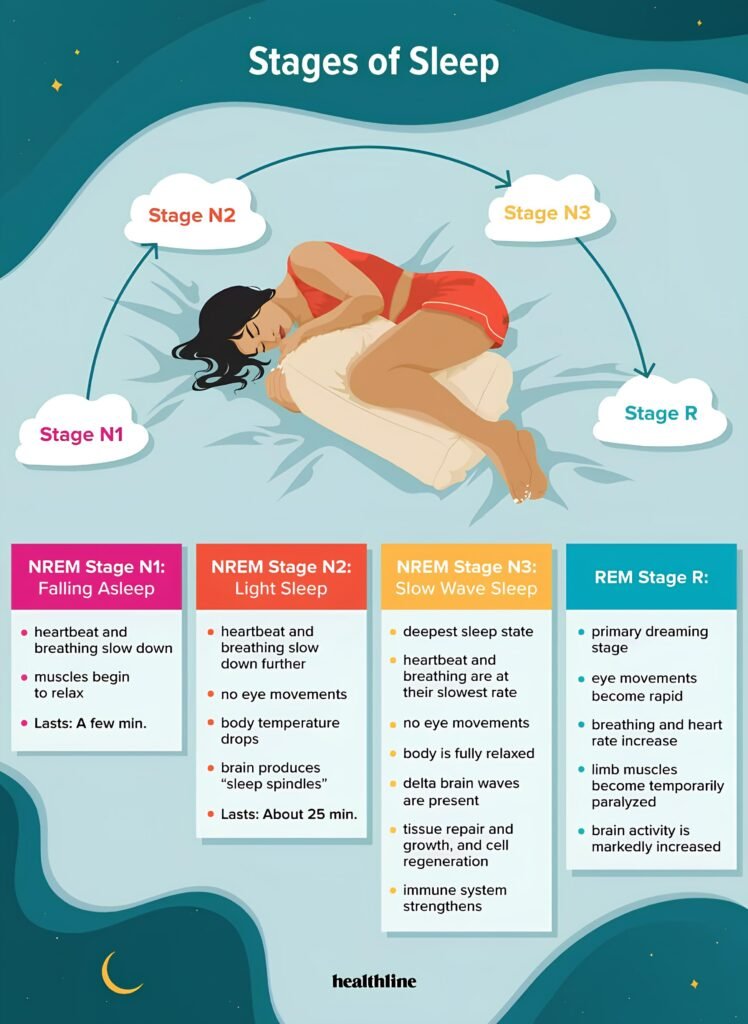Sleep is essential for our health, just like food and water. Yet, millions of people struggle to get quality rest. Have you ever wondered why? From modern lifestyles to underlying health issues, the reasons can be surprisingly complex.
In this blog, we’ll dive into the science of sleep, uncover the reasons behind poor sleep, and share actionable tips to help you rest better. Let’s unravel the mystery of your sleepless nights.
The Science of Sleep: How It Works
Sleep isn’t just “shutting off” for the night. It’s an active process where your body repairs itself, consolidates memories, and balances hormones. Sleep occurs in cycles, alternating between REM (rapid eye movement) and non-REM sleep.
During these stages:
- Non-REM Sleep: Your body focuses on physical repair.
- REM Sleep: Your brain processes emotions and memories.
When sleep is disrupted, these processes are incomplete, leading to fatigue, poor focus, and even long-term health problems.

Image Source: [Healthline]
Why You’re Not Sleeping Well: Common Culprits
1. Stress and Anxiety
Stress is one of the leading causes of insomnia. When your mind races with worries, your body produces cortisol—a hormone that keeps you alert. Chronic stress disrupts your ability to fall and stay asleep.
What to Do: Practice mindfulness or deep breathing exercises before bed to calm your mind.

2. Irregular Sleep Schedules
Our bodies thrive on routine. Irregular sleep patterns, such as sleeping late on weekends, confuse your internal clock (circadian rhythm), making it harder to fall asleep during the week.
What to Do: Go to bed and wake up at the same time every day, even on weekends.

3. Too Much Screen Time
Blue light emitted by phones, tablets, and computers suppresses melatonin, the hormone responsible for sleep. Scrolling through social media or watching TV right before bed can trick your brain into thinking it’s still daytime.
What to Do: Avoid screens for at least an hour before bed or use blue light-blocking glasses.

4. Dietary Habits
What you eat and drink can significantly impact your sleep. Caffeine and sugar consumed late in the day can keep you awake. Similarly, heavy meals close to bedtime may cause discomfort and disrupt your sleep.
What to Do: Limit caffeine intake after noon and opt for light, nutritious snacks if you’re hungry before bed.

5. Health Issues
Conditions like sleep apnea, restless legs syndrome, or chronic pain can severely impact sleep quality. Sometimes, poor sleep can also be a sign of mental health issues like depression.
What to Do: If you suspect an underlying health problem, consult a healthcare provider for proper diagnosis and treatment.

The Role of Environment in Sleep Quality
Your bedroom environment plays a crucial role in how well you sleep. A cluttered, noisy, or brightly lit space can make it difficult to relax.
Optimize Your Sleep Space:
- Keep It Cool: A room temperature between 60-67°F is ideal.
- Block Out Light: Use blackout curtains or a sleep mask.
- Reduce Noise: White noise machines or earplugs can help.

Practical Tips for Better Sleep
- Stick to a Routine: Sleep and wake up at the same time daily.
- Limit Naps: Avoid long daytime naps that can disrupt nighttime sleep.
- Exercise Regularly: Physical activity improves sleep quality but avoids intense workouts close to bedtime.
- Create a Wind-Down Ritual: Read, meditate, or take a warm bath to signal your body it’s time to rest.
- Seek Professional Help: If poor sleep persists, a sleep study might provide answers.

Long-Term Effects of Poor Sleep
Neglecting sleep doesn’t just leave you tired—it can lead to severe health issues:
- Increased risk of heart disease and diabetes.
- Weakened immune function.
- Cognitive decline and memory problems.
- Mental health disorders like anxiety and depression.

Image Source: [Sleep Foundation]
Conclusion: Take Control of Your Sleep
Sleep is a cornerstone of good health, but modern life often gets in the way. By understanding the science behind sleep and addressing the root causes of your sleepless nights, you can take meaningful steps toward better rest.
Remember, small changes—like reducing screen time or maintaining a consistent schedule—can make a big difference. Prioritize your sleep, and your body and mind will thank you.

Image Source: [Sleep Foundation]







0 Responses